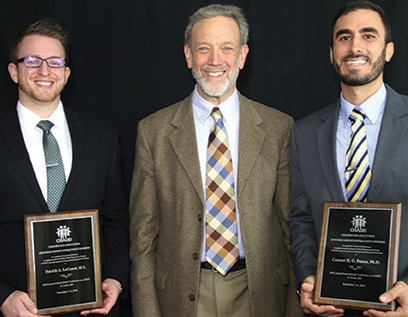Celebrating Emerging ADHD Researchers
Zuali Malsawma
Attention Magazine February 2019
Download PDF
CHADD IS PLEASED TO PRESENT the 2018 Young Scientist Research Awards to Connor H.G. Patros, PhD, and Patrick A. LaCount, MS. Selected from a pool of well-qualified applicants by experts in the field, these young researchers are making contributions to our understanding of ADHD.
Application reviewers from CHADD's Professional Advisory Board examined the research study and academic records of these award recipients, their publications, recommendations from professors, and planned future contributions to the field. Their research submissions were evaluated on significance, rigor of methodology design, clarity of the problem, relevance/adequacy of literature review, and contribution of new knowledge.
 At the 2018 Annual International Conference on ADHD in St. Louis, Missouri, Max Wiznitzer, MD (center), co-chair of CHADD’s Professional Advisory Board, presented the 2018 Young Scientist Research Awards to Patrick A. LaCount, MS (left), and Connor H.G. Patros, PhD (right).
At the 2018 Annual International Conference on ADHD in St. Louis, Missouri, Max Wiznitzer, MD (center), co-chair of CHADD’s Professional Advisory Board, presented the 2018 Young Scientist Research Awards to Patrick A. LaCount, MS (left), and Connor H.G. Patros, PhD (right).Assessing Underlying Neurocognitive and Neurological Factors Associated with ADHD-Related Impulsivity | Connor H.G. Patros, PhD
Treatment for ADHD has historically utilized psychostimulant medication to target neural regions that impact the cognitive and behavioral profiles of children with the disorder. While acutely effective, this intervention approach is not effective upon discontinuing medication use, suggesting that alternative treatments targeting and strengthening underlying deficits might yield more positive long-term outcomes. Accordingly, the identification of potential underlying features of the disorder (that can be targeted in treatment) represents Dr. Patros's primary area of interest.
His work examines endo-phenotypes of ADHD (working memory, for example), which represent malleable neurocognitive processes that can potentially be targeted within treatment. Further, he is receiving comprehensive training to incorporate cutting- edge neuroimaging techniques into his work, to further examine the neurobiological profiles of children, adolescents, and adults with ADHD. Specifically, he will be examining white matter integrity and how it corresponds to various ADHD- related executive deficits (such as working memory problems) and behaviors (impulsivity, for example).
The ultimate goal of Dr. Petros's work is to identify a set of neurocognitive and/or neurobiological mechanisms that can be utilized as targets for future intervention and/or serve as indicators of ADHD within the context of assessment.
Connor H.G. Patros, PhD, is a postdoctoral research fellow in the department of psychology at Temple University in Philadelphia, Pennsylvania. He earned his PhD in clinical psychology from Oklahoma State University in 2017. His research aims to expand the current understanding of the mechanisms driving ADHD.
Acute Cognitive Effects of High-Intensity Aerobic Exercise in College Students with ADHD | Patrick A. LaCount, MS
Young adulthood (ages 18-25) is a time of profound change, during which there is an abrupt loss of parental support and structure. In addition to the excitement of pursuing work and love life possibilities, young adults must adapt to new stresses and responsibilities. For those with ADHD, this can be a particularly difficult transition.
While treatment research for adults with ADHD has been growing to match that amassed on childhood ADHD treatments, little attention has been given to those in young adulthood. This is concerning since adjustment during this period predicts functioning in adulthood, where those with ADHD often struggle with self-esteem, education and vocational attainment, risky behaviors, and relationships.
LaCount's research focuses on tailoring treatments to address the unique needs of young adults with ADHD. In addition to researching traditional cognitive-behavioral and skills-based treatment approaches (such as organization, time management, planning), he has begun to investigate more novel interventions. Currently, he is researching the therapeutic benefits of physical exercise for young adults with ADHD on cognitive functioning, mood, sleep, and physical health. Ultimately, he hopes his research will translate into innovative treatment strategies for improving outcomes among young adults with ADHD.
Patrick A. LaCount, MS, is a doctoral candidate in the clinical psychology program at University of Wyoming. He is currently completing his predoctoral internship at Duke University Medical Center. His research aims to expand our knowledge of the manifestation and treatment of ADHD in association with the adjustment to adulthood.
Zuali Malsawma, MLS, is the health sciences librarian for CHADD’s National Resource Center on ADHD.
Other Articles in this Edition
Mindfulness, Meditation, and Yoga as Treatments for ADHD
Celebrating Emerging ADHD Researchers
The Challenging Horizons Program and School Success
ADHD and Life Expectancy: Treatment Matters More Than You Might Think
Health Outcomes of ADHD: Is There an Effect on Life Expectancy?
Children and Violent Behavior: Where it Comes From and What to Do
Managing Inattentive ADHD with Psychosocial Treatments
Homework: Do You Take More Responsibility Than Your Child Does?
Summer Camps: Like Horses for Courses
Frenzied, Frazzled, and Overwhelmed: The Interaction of Hormones and ADHD in Women in Midlife
